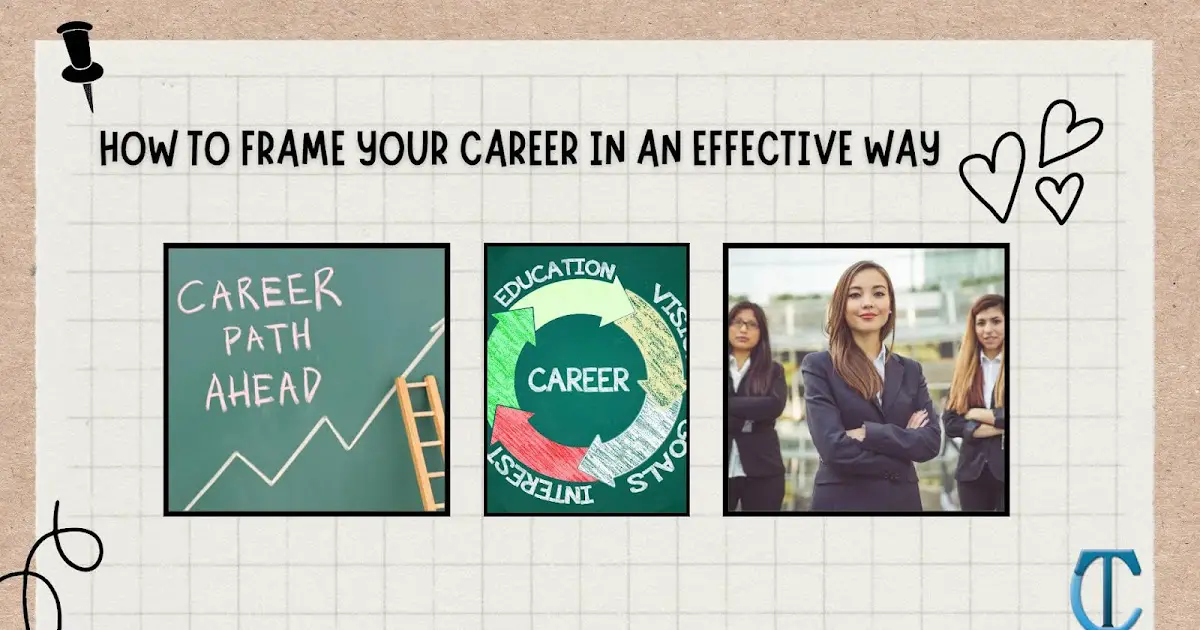Donations Make us online
Introduction
Your manager and team leader are not responsible for your career. Even with a
talent management system to manage and develop your skills, you are still
accountable!
Pursuing a career is more rewarding than focusing entirely on a job. Besides,
statistics show
that maintaining a job for an extended period in today’s fast-paced world is
complicated. Job security no longer applies.
Due to the extreme uncertainty, it’s crucial to identify and build your
career. This way, you’ll have solid ground to help you thrive through stormy
economic times.
Here are vital methods you could use to frame your career effectively.
Ways to Frame Your Career in an Effective Way
Crafting a compelling career narrative can be a helpful way to communicate
your goals and experiences to potential employers. Also, it’s a valuable
exercise for you in terms of clarifying your career aspirations. Let’s
indulge!
#1 Identify Your Skills and Strengths
Think about what you are adept at and what you find enjoyable. This will be
the foundation of your career, as it will help you understand what sets you
apart from others.
An excellent place to kick-start and enjoy the journey would be to use the
best and most reliable tool for
talent management. This entails attracting, developing, and retaining top talent. It involves
identifying the skills and strengths needed to achieve the company’s goals.
Then, it helps to find and develop employees who possess particular skills.
Talent management technology is also valuable for employees to frame their
careers. It provides several features that enable steady performance and
feedback.
Consequently, a talent management system allows employees to understand their
strengths and areas for improvement. Employees can use the feedback to
identify areas for development and take steps to improve their performance.
Here are some steps you can use in a talent management strategy to identify
your skills and strengths:
- Reflect on your past experiences.
- Consider your natural abilities.
- Seek feedback from others.
- Take personality and aptitude tests.
Talent management, reflecting on your experiences, and seeking input from
others are crucial steps for identifying your skills and strengths. This way,
you can frame your career with a clear picture.
#2 Set Applicable Goals
What do you plan to accomplish in your career? Having a clear sense of your
long-term goals can help you streamline your efforts and make wise decisions.
The best method would be to use a talent management system to ensure your
goals are specific, measurable, attainable, relevant, and time-bound.
Follow the steps below to set goals for your career:
-
Identify your long-term career aspirations: Think about where you
want to be in the long term and what you want to achieve. This can help
guide the goals you set for yourself. -
Simplify your future goals into a more achievable set of actions:
Long-term goals can be overwhelming and hard to achieve. Breaking them
into smaller, more manageable actions can make them seem more achievable.
Plus, you’ll make step-by-step progress toward your long-term aspirations. -
Set specific and measurable goals: Rather than an indefinite goal
like “improve my skills,” try setting a specific, measurable goal like
“attain a certification in project management within the next 5 months.”
This can help you track your progress and know when you have achieved your
goal. -
Set a timeline: Give yourself a timeline for achieving each goal.
This can help you stay motivated and on track. -
Review and revise your goals: Review your goals to see if they are
still relevant and achievable. If necessary, revise them to reflect
changes in your circumstances or priorities.
# 3 Create a Personal Brand
reflects your values, personality, and unique skills and experiences.
A personal brand statement makes you stand out from others in your field.
It should also be specific, memorable, and authentic. Using a talent
management strategy to create your brand will help communicate what you
do, who you help, and how you do it differently.
To create a personal brand statement, endeavor to do the following:
-
Establish your unique value proposition: What makes you stand out
in your field? What skills and qualities do you have that make you
valuable to your employer or clients? -
Identify your target audience: Who do you want to reach out to
with your brand? What are their needs and challenges, and how can you
help them? -
Craft your statement: Combine your
unique value proposition
and target audience into a clear and concise statement. Avoid vague or
generic language and focus on the specific benefits you offer. -
Test and refine: Share your brand statement with a few trusted
colleagues or friends and ask for their feedback. Use their feedback to
improve and polish your statement until it accurately shows who you are
and what you’re worth as a professional.
After creating a solid personal brand statement, you can use it to inform
your career-related communication. This includes your resume, online
portfolio, and networking conversations.
In the end, you’ll present yourself consistently and clearly before
potential employers and clients. Also, you’ll get to stand out in a
competitive job market.
# 4 Build a Steady Network
development. Your network will help you make connections and build
relationships that may benefit your professional growth. Check out the steps
you can take to build a strong network below:
-
Attend industry events and conferences: This is an excellent
opportunity to meet and connect with people in your field. -
Join professional organizations: These organizations often have
regular meetings and events where you can meet and network with others
in your industry. -
Connect with people on LinkedIn: LinkedIn is an excellent
platform for making professional connections. Make sure to regularly
update your profile and engage with others in your field. -
Volunteer or intern: This can be a great way to gain experience
and make connections in your field for your career advancement. -
Network with your colleagues: Building relationships with your
coworkers can be essential to enhance your network. Be sure to remain
friendly and approachable. Also, take opportunities to connect with your
colleagues outside of work when appropriate. -
Ask for introductions: If you want to meet someone specific,
don’t hesitate to ask for an introduction. Often, people are happy to
make connections with others.
These steps help you be proactive about building your network. This way,
you can create a strong foundation for your career development.
# 5 Continuously Learn and Grow
trends and developments in your field is essential. Besides, a survey showed
that
about 87% of millennials
considered career growth important. So, how should you learn and grow?
Consider taking courses or earning additional certifications to stay
competitive and keep your skills sharp. Also, look for new responsibilities
and challenges that can help you expand your skills and experiences.
Building relationships with others in your industry is another way to
provide valuable opportunities for learning and growth. Consider finding an
experienced mentor who’ll be a role model and can also provide guidance,
motivation, and support.
It’s crucial to show how your career has progressed and how you have taken
on increasing levels of responsibility. This can help demonstrate your
growth and potential.
Parting Shot
searching, networking, and advancing your professional development. With
talent management, you can quickly find your strengths and accomplishments
and tell others about them clearly and convincingly.
When actively working towards career growth, you may feel more engaged and
motivated in your work. This can help you stay energized and excited about
your career, even when facing challenges. Eventually, your career becomes
personally fulfilling.
Source link










Leave a Reply